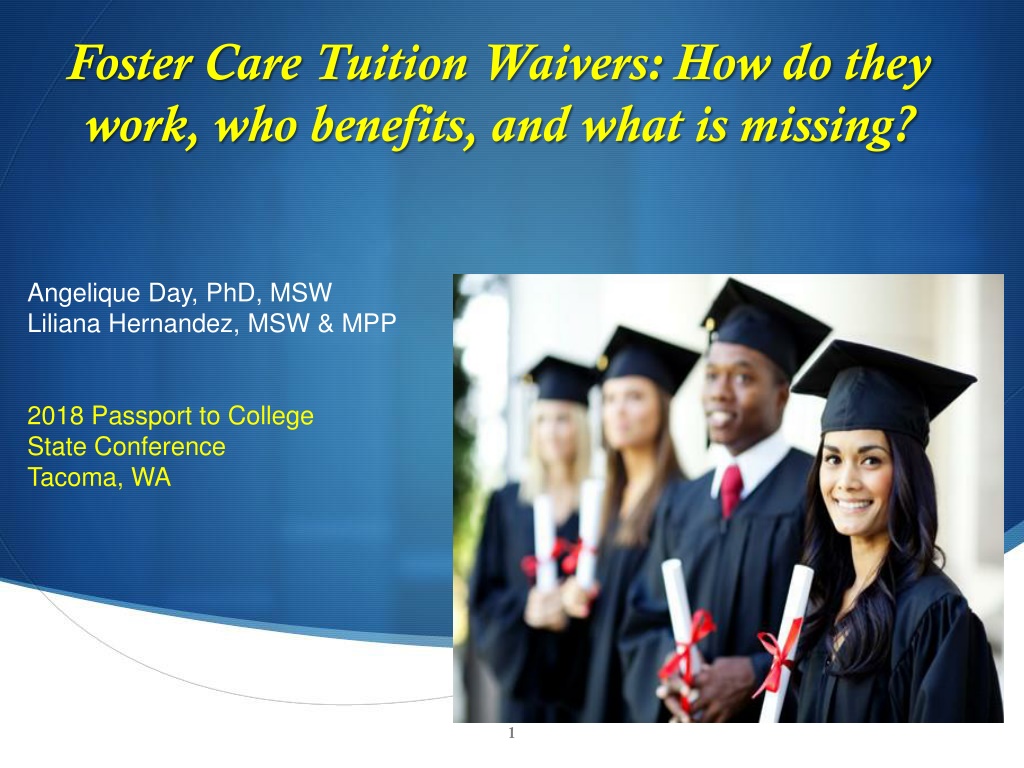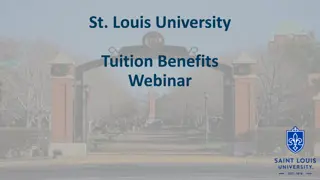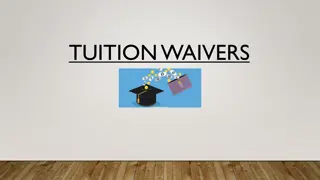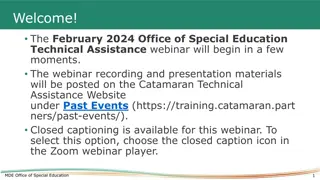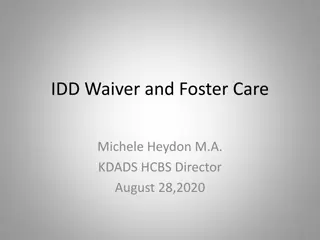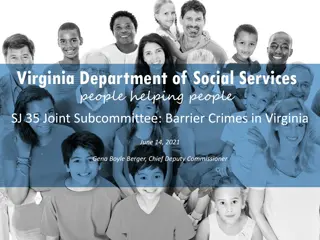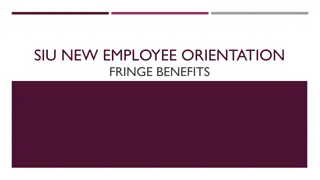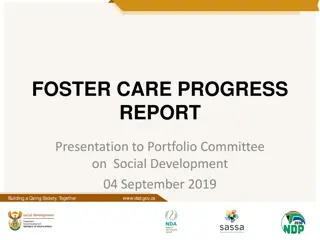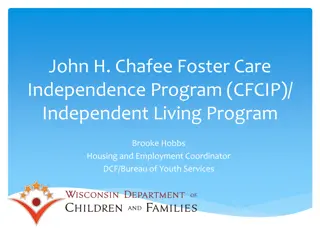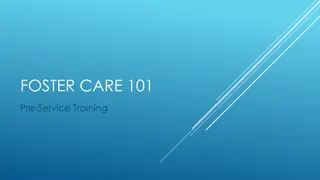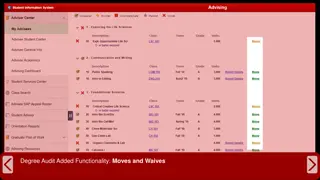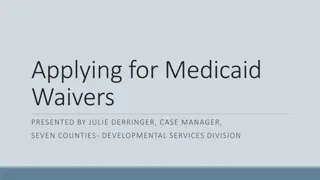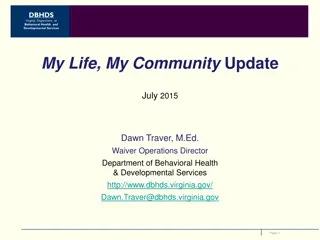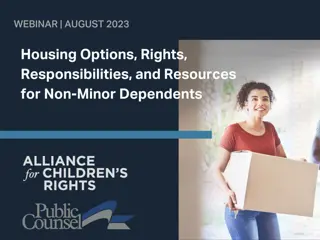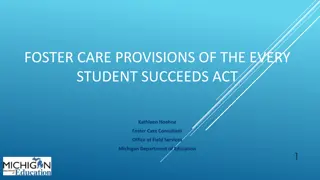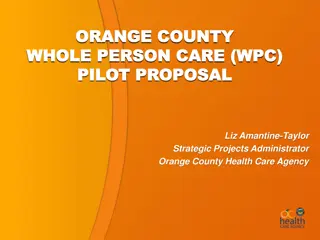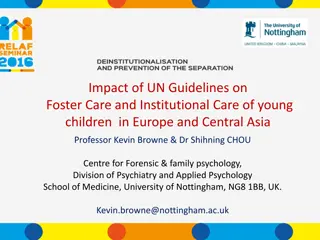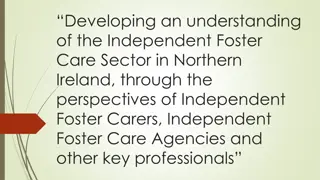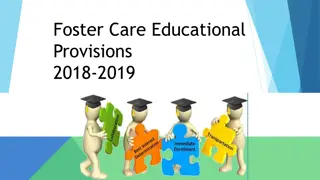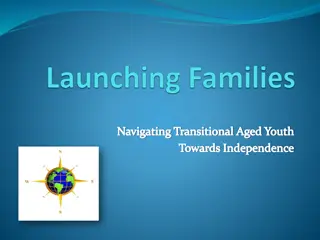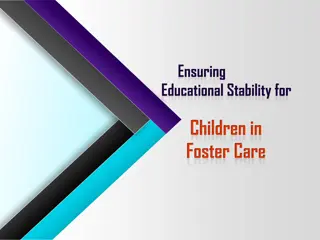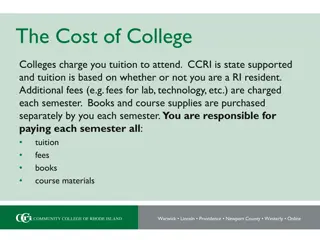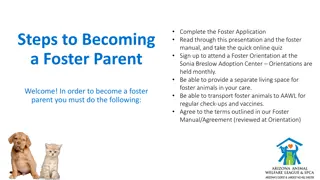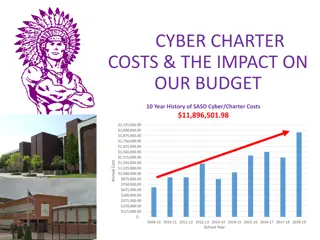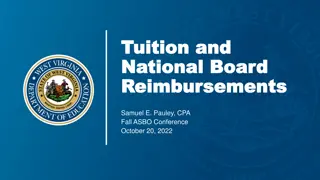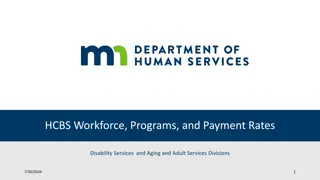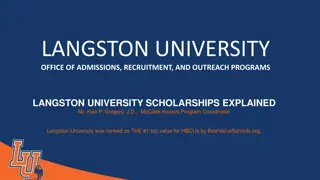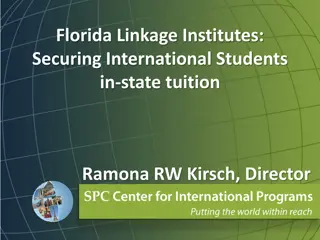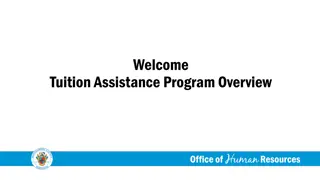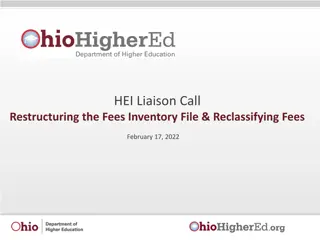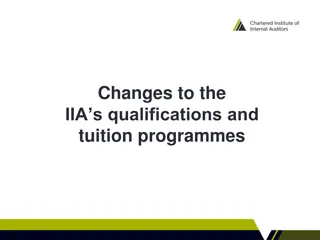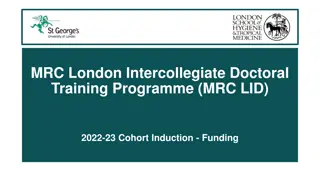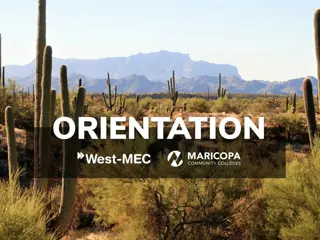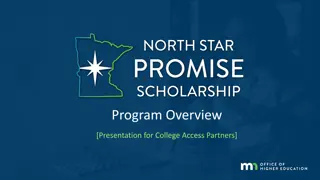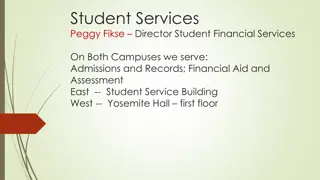Foster Care Tuition Waivers: Benefits, Challenges, and Solutions
This informative content delves into the workings of foster care tuition waivers, shedding light on who benefits from them and pointing out the gaps that exist in the system. It also explores the challenges faced by youth in care, from K-12 readiness barriers to higher education obstacles. The Passport to College Scholarship program and its expansion under 2SSB 6274 are detailed, highlighting how they support students transitioning from foster care to post-secondary education, including eligibility criteria and additional programming like apprenticeships.
Download Presentation

Please find below an Image/Link to download the presentation.
The content on the website is provided AS IS for your information and personal use only. It may not be sold, licensed, or shared on other websites without obtaining consent from the author. Download presentation by click this link. If you encounter any issues during the download, it is possible that the publisher has removed the file from their server.
E N D
Presentation Transcript
Foster Care Tuition Waivers: How do they work, who benefits, and what is missing? Angelique Day, PhD, MSW Liliana Hernandez, MSW & MPP 2018 Passport to College State Conference Tacoma, WA 1
How many youth in foster care pursue post- secondary education? 70% 80 70 60 50 40 30 20% 20 5% 10 0 Desire Enroll Graduate 2
Challenges Faced by Youth in Care K-12 Readiness Barriers Higher Education Barriers School/placement instability Remedial classes, fin aid limits, Lack of awareness of fin aid programs lack of college advocates Grade repetition, lower testing scores, higher rates of Special Education Housing/homelessness during college breaks Few engaged in precollege programs/lack of internships/ Health issues, Substance Abuse/Mental Health, Learning Disabilities Lack of counseling - financial aid and college applications Lack of family support, Trust/Attachment issues/ Independent- survival mode Impact of being in foster care on one s self determination, identity formation and achieving normal developmental milestones Few college programs are aware of their support needs 3
Passport to College Scholarship 340 students received in 2017, $4,500 max award. Be working toward earning their first bachelor s degree, associate degree, or certificate- not purse a theology degree. Eligibility Requirements Former foster child was in care for at least 1yr after age 16 Emancipate from care on or after January 1, 2007. Enroll at least half-time in an eligible college by their 22nd birthday. Maintain Washington residency. Data exchange enables verification of student eligibility http://www.readysetgrad.org/colle ge/passport-foster-youth- promise-program
Passport to College Scholarship 2SSB 6274 expanded the Passport program in two ways: broadened eligibility and provides additional programming: Additional Programming: Eligibility: expanded to include students who were in the care of the state foster care system, tribal foster care system, or federal foster care system in Washington state at any time before age twenty-one subsequent to the following: - Age fifteen as of July 1, 2018; - Age fourteen as of July 1, 2019; and - Age thirteen as of July 1, 2020; - Or, beginning July 1, 2019, were verified on or after July 1st of the prior academic year as an unaccompanied youth experiencing homelessness, before age twenty-one. Apprenticeships: establishes a programmatic pathway to support students pursuing apprenticeships The Passport to Apprenticeship Opportunities program.
Passport Supportive Services 47 colleges have a Passport Viable plan. Basic household needs, rent and childcare in summer Medical expenses & counseling costs Graduation Expenses Prepaid cell phone with minutes Employment and internship Tours of 4 year colleges Incentives for students meeting quarterly goals Peer mentoring program https://www.wsac.wa.gov/sites/default/files/2018.P assportGrantInformation.pdf Supportive Services include: Paid Tutors for Passport to College students Private Computer lab for passport students Lending library for textbooks, laptops, calculators, Dorm room supplies Transportation assistance Food vouchers, care packages
22 State Tuition Waiver Programs for Foster Youth http://www.tipwaynestate.org/interactive-tuition-waiver-map.html 7
Best Practices of Tuition Waivers Recommendations Allow Part-Time Status Siblings also eligible (MD) Expand eligibility to tribal children (OR) Expand eligibility for adoption and guardianship cases No age limit for youth to apply No age for eligibility (ME& WV) No time limit in foster care No restrictions on waiver use TX youth can use waiver indefinitely but must take a class by age 25 CT covers tuition, fees, and room & board out of state, (Up to $27,630)
Texas Tuition Waiver Only State to extend eligibility to A child who exits TX conservatorship and returns to biological parent even after termination of parent s rights Any Student must Enroll in Waiver class at any public university before 25th birthday to access waiver No Age limit once the waiver is activated before age 25. Waiver can be used for graduate education. Texas https://www.dfps.state.tx.us/Child_Protection/Youth_and_Young_Adults/Pos t_Secondary_Education/college_tuition_waiver.asp
Connecticut Post Secondary Education Assistance Age & Time Limit Assistance includes: Must use the waiver by 21st birthday And can continue to use it until age 23. Tuition, fees, books, room & board equal to the cost of Univ of Conn Storrs Campus- $7,029 Student must contribute $500 to educational costs per year. Summer classes can be covered. Each semester provides documentation of enrollment/grades. 2.0 minimum GPA CT Post Secondary Education Assistance http://www.ctfosteradopt.com/fosteradopt/cwp/view.asp?Q=447946&a=379 5#CAPSCEA
Maryland Tuition Waiver Eligibility Requirements Resided in foster care at the time of HS graduation or the time of receiving a GED Resided in OOHC on 18th b-day or Was placed into guardianship or adoption after age 13 Includes a younger sibling also placed in the same adoptive or guardianship home. (only state to include this) Unaccompanied homeless youth who qualifies as an independent student Must be enrolled in a university before age 25. Can be used until the youth receives a bachelors degree or 5 years after college enrollment MD Tuition Waiver for Foster Care Receipients http://mhec.maryland.gov/preparing/Pages /FinancialAid/ProgramDescriptions/prog_fo stercare.aspx
History of Tuition Waivers Year Implemented State Other Subpopulations 1988 Florida Veterans, Coast Guard, 1993 Texas Law Enforcement, Firefighters, EMT, Surviving Spouse or Child 1994 Connecticut 1999 Kentucky, Maine Teachers, Nurses 2000 Massachusetts, Rhode Island, Virginia Blind, Deaf Students 2007 Maryland Adopted & Kinship youth 2012 Oregon 12
BiPartisan Support of Tuition Waivers 13 States had divided governor/legislatures: (FL, CT, MN, OK, MA, ME, RI, WV, NJ, MD, MO, OR, NM) 13 states had a Republican governor. (CT, MN, OK, MA, RI, VA,WV, KS, AK,MD, SC, AZ, NM) 8 states had a Democratic Governor. FL, TX, KY, NJ, NH, NC, MO, OR. (ME- Independent Gov.) 13 Democratic Legislatures were in place at the time of waiver implementation. 4 states had both Rep Gov/Legis: AK, AZ, KS, VA 4 states had both Dem Gov/Legis: TX, KY, NH, NC 13
Number of Waivers & Cost in 2014 #Students State 973 waivers granted of 4,739* eligible 3,195 Cost Florida Only 6 states had totals of 100-500 waivers awarded 10 states had less than 100 youth who received waivers. Texas $8,389,635 foregone tuition $4,143,303 488 353 335 106 47 Connecticut Massachusetts North Carolina $1,928,490 Maryland Oregon 4 states had no data on # of waivers. (KY, NJ, NM, WV) $64,130 14
Age & Time in Care Requirements State Age Time in Care 2 States have no Age requirement Maryland 13 (if adopted, 18 otherwise) After 16 6 states - be over age 16 Oregon Be in care, or was in care for 6 months before age 16 11 states student 18yrs old 10 States have no Time Texas 1 day before 18th bday 15
Age for Waiver Application 5 states require youth to apply for the Waiver prior to age 21 4 states allow youth to apply for the Waiver between the ages of 23-24. 6 states require youth to apply before age 25. 2 states require youth to apply within 2-3 years after graduating from HS. http://www.tipwaynestate.org/policy-projects.html
Implications for Policy & Practice Many Foster Youth at Risk of losing access to Federal Pell Grants BEFORE graduation Pell Grants expire after12 semesters 6 years if they do not use Pell Grants for summer classes; Tuition waiver programs are often last dollar programs, and waiver dollars are limited in many states that offer them. Both the Higher Education Act & the Chaffee Act are up for reauthorization this year. There are opportunities to strengthen Financial Aid Policies to support the college going efforts of FY. Need for effective outreach and increased funding for the Chafee ETV 1) Tuition waivers vary drastically in terms of eligibility for participation across states. 2) Outcome data on program effectiveness of Waivers are lacking 3) Waiver programs should link their data with the National Student Clearinghouse as a cost-effective and efficient way to address the data gap 4) Youth in foster care take 7 yrs to graduate with a Bachelor degree, 1 year longer than other low income first generation students.
HR 253 Family First Prevention Services Act of 2017 HR 2847 Improving Services for Older Youth in Foster Care Act Both of these bills would revise the John H. Chafee Foster Care Independence Program to: Allow states that extend foster care eligibility up to age 21 to extend assistance and services to youth who have aged out of foster care but have not yet reached age 23 Authorize redistribution of unexpended Chafee amounts to other states Allow youth to be eligible for Educational and Training Voucher program through age 25 (but no more than 5 years) 18
S. 1795/HR 3740 (115th) Higher Education Access and Success for Homeless and Foster Youth Act Amends the Higher Education Act of 1965 With respect to a student's independence for purposes of financial aid, a financial aid administrator must: (1) accept a homelessness determination made by an authorized individual; and (2) make such a determination if the student cannot get documentation from a designated authority. A student determined to be independent on this basis shall be presumed independent for a subsequent award year at the same institution. To be eligible for certain federal funds, a university must meet specified requirements related to student housing, coordination, and notice of financial assistance eligibility for homeless and foster care students. 19
S. 1795/HR 3740 (115th) Higher Education Access and Success for Homeless and Foster Youth Act The Department of Education shall require an entity to make specified assurances such as prioritizing federal work-study children and youth who are homeless or in foster care. For purposes of income-based financial aid determinations, the bill excludes from income: (1) the value of specified vouchers for education and training, and (2) direct payments made through an extended foster care program. For children or youth who are homeless or in foster care, colleges will only be allowed to charge them in-state tuition rate. 20
HR 3742/S 1792 Fostering Success in Higher Education Act of 2017 Amends the Higher Education Act of 1965 to: $125 million a year to states/tribes establish or expand statewide initiatives that assist foster and homeless youth in enrolling and graduating college Establishes formula grants to states based on state s share of foster and homeless youth among all 50 states, tribes and territories with a $500,000 minimum grant Dedicates 70% of state grants to develop institutions of excellence committed to serving foster and homeless youth via robust support services and substantial financial assistance, in collaboration with Child Welfare and organizations serving homeless, by providing comprehensive wraparound services, hiring FT campus coach , and ensuring student health and mental health services Directs 20% state grants to establish intensive, statewide transition initiatives to increase understanding, preparation and application of foster and homeless youth in college Provides 7% of funds for technical assistance and evaluation to inform best practice/Reserves 5% funds to tribes 21
Review of Research on Postsecondary Educational Attainment Foster Care Non-Foster Care Community College 43% 29% 19-year olds pursuing a 4 year degree 18% 62% 25-year olds with a bachelor s degree 3% 24% College students who have earned a degree within 6 years of enrollment Time to graduation 26% 56% 7 years Up to 21semesters 6 years 12 semesters 22
Identifying Foster Care students through the FAFSA Independent Status Finding Admitted Students FAFSA Q53:(in section 2) on the Free Application for Federal Student Aid asks: "At any time since you turned age 13, were both of your parents deceased, were you in foster care or were you a dependent or ward of the court? FAFSA Q54: Are you an accompanied youth who is homeless or self supporting and at risk of being homeless? Addressing Enrollment Barriers College Admission Applications ask if a student had been in foster care. (Ex. Wayne State College Application Question) Were you in foster care on or after your 13th birthday in the state of Michigan? Michigan child welfare agency has a data sharing agreement with universities to electronically verify if a student had been in foster care. 23
Citations Liliana Hernandez, Angelique Day & Michael Henson (2017): Increasing College Access and Retention Rates of Youth in Foster Care: An Analysis of the Impact of 22 State Tuition Waiver Programs. Journal of Policy Practice, DOI: 10.1080/15588742.2017.1311819 Tuition Waiver Brief State ETV website links http://www.tipwaynestate.org/policy-projects.html Interactive Tuition Waiver Map http://www.tipwaynestate.org/interactive-tuition-waiver- map.html
Federal References Children s Bureau Education Stability Webpage includes Guidance on Every Student Succeeds Act https://www.childwelfare.gov/topics/systemwide/service- array/education-services/meeting-needs/educational-stability/ Department of Education Students in Foster Care http://www2.ed.gov/about/inits/ed/foster-care/index.html Providing Effective Financial Aid Assistance to Students from Foster Care and Unaccompanied Homeless Youth http://calswec.berkeley.edu/files/uploads/pdf/CalSWEC/EdRight s_ProvidingEffectiveFinancialAid.pdf
Foster Care Extension to 21 Chafee Legislation/Child Welfare Policy Manual: https://www.acf.hhs.gov/cwpm/programs/cb/laws_policies/laws/cwpm/policy.jsp?idFlag=3 23 States receive Fed & State funding to 21 (includes WI) 48 States extend Foster Care past age 18, usually for students still completing HS up to age 19. http://www.tipwaynestate.org/policy-projects.html Casey State Policy Database: http://www.childwelfarepolicy.org/maps/single?id=85
Thank You!!! Angelique Day, PhD Liliana Hernandez, MSW/MPP Assistant Professor University of Washington, School of Social Work Virginia Family and Children s Trust Fund Mslhernandez@gmail.com dayangel@uw.edu For more information: http://depts.washington.edu/fost ered/policy 27
